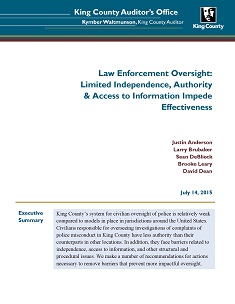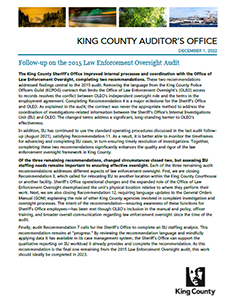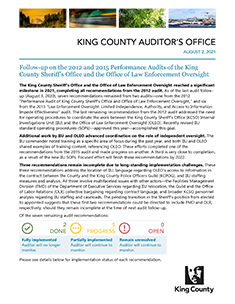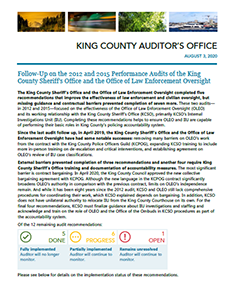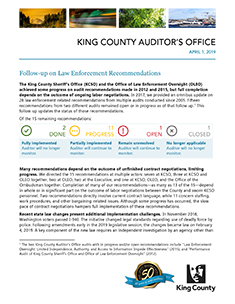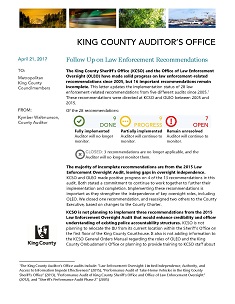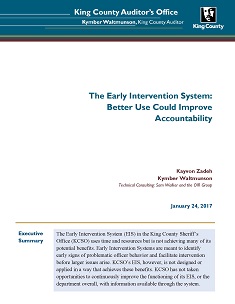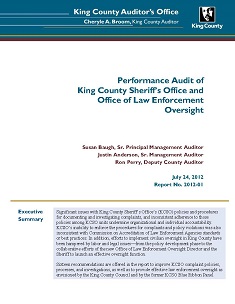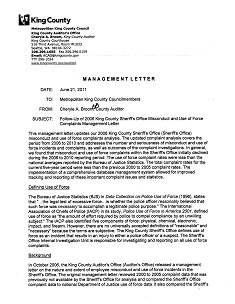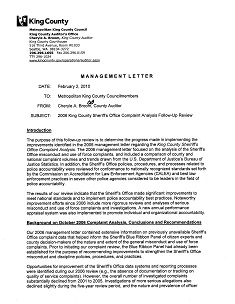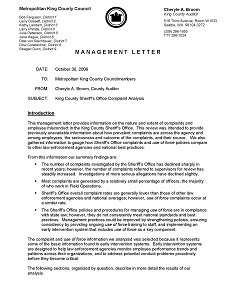Law Enforcement Oversight: Limited independence, authority, and access to information impede effectiveness
July 14, 2015
NEW! Download the latest follow-up report
King County’s system for civilian oversight of police is relatively weak compared to models in place in jurisdictions around the United States. Civilians responsible for overseeing investigations of complaints of police misconduct in King County have less authority than their counterparts in other locations. In addition, they face barriers related to independence and access to information—elements that are critical to the success of oversight. Notably, civilian oversight operations are defined by the terms of labor contracts. Consequently, the processes and authority of oversight are defined by the Sheriff’s Office and its employees, creating a conflict of interest that cannot be easily resolved. We make a number of recommendations for actions necessary to remove barriers that prevent more impactful oversight. Presented July 14, 2015 to the Government Accountability & Oversight Committee and the Law, Justice & Emergency Management Committee.
Status
Of the 13 recommendations:
| DONE | 8 | Recommendations have been fully implemented. Auditor will no longer monitor. |
|---|---|---|
| PROGRESS | 1 | Recommendations are in progress or partially implemented. Auditor will continue to monitor. |
| OPEN | 0 | Recommendations remain unresolved. Auditor will continue to monitor. |
| CLOSED | 4 | Recommendation is no longer applicable. Auditor will no longer monitor. |
Summary
Effective law enforcement oversight promotes the professionalism of the King County Sheriff’s Office and can help build trust with the communities it serves. King County’s Office of Law Enforcement Oversight (OLEO) and the Sheriff’s Internal Investigations Unit (IIU) are intended to work jointly to ensure that complaints of misconduct involving Sheriff’s Office employees are properly investigated. In addition, OLEO has the authority to make systemic recommendations to improve Sheriff’s Office operations. This audit of law enforcement oversight focuses on the system currently in place in King County and identifies structural impediments and other barriers to success. We consulted experts in the fields of law enforcement oversight and labor negotiations, including conducting both a survey and an expert panel, to inform our findings and recommendations.
The system of civilian oversight currently in place in King County has limited authority compared to other oversight functions across the United States. In addition, there are significant barriers in place that undermine OLEO’s independence and access to information—elements that are critical to its success. For instance, restrictions prevent OLEO from downloading and/or printing documents related to complaints and investigations, and a contract provision allows OLEO’s access to these files to be cut off. This limits OLEO’s access to information, making it difficult for OLEO to provide meaningful oversight. There are also problems with the way law enforcement oversight is set up that threaten the independence of oversight. Notably, OLEO operations are defined by the terms of labor contracts. Consequently, OLEO’s processes and authority are defined by those it oversees, creating a conflict of interest that cannot be easily resolved.
To ensure effective law enforcement oversight, we recommend that the County Sheriff and the County Executive provide OLEO with unrestricted access to information and take several steps to cement the independence of both OLEO and IIU. We also present multiple options for addressing structural impediments to OLEO’s authority contained in existing labor agreements. Experts and stakeholders agree that many topics contained in the labor agreement may be more appropriately addressed in King County Code, but potential solutions are complex and will require collaboration among multiple parties with sometimes opposing interests. See Appendix 1 for a full matrix of recommended actions.
Reports related to this audit
December 1, 2022
Download the report
August 2, 2021
Download the report
August 3, 2020
Download the report
April 1, 2019
Download the report
April 21, 2017
Download the report
Click on the image(s) below to view related reports.
|
January 24, 2017 |
July 14, 2015 |
July 24, 2012 |
||
|
June 21, 2011 |
February 2, 2010 |
October 30, 2006 |
Audit team
Justin Anderson, Larry Brubaker, Sean DeBlieck, Brooke Leary, and David Dean conducted this audit. If you have any questions or would like more information, please call the King County Auditor's Office at 206-477-1033 or contact us by email KCAO@kingcounty.gov.

 Translate
Translate
